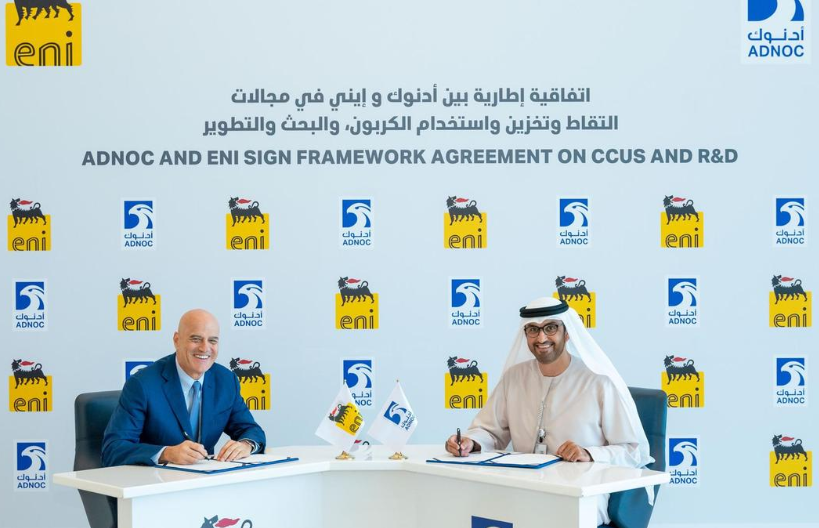 Eni chief executive Claudio Descalzi signs the agreement with UAE Minister of State and Adnoc group chief executive Dr Sultan Al Jaber, Image courtesy of Adnoc
Eni chief executive Claudio Descalzi signs the agreement with UAE Minister of State and Adnoc group chief executive Dr Sultan Al Jaber, Image courtesy of Adnoc
Abu Dhabi National Oil Company signed a strategic framework agreement with Italy’s energy company Eni to explore opportunities to collaborate on carbon capture utilisation and storage (CCUS).
The agreement builds on an existing relationship between the two firms and expands on the state-owned oil firm's recent announcement of a set of sustainability goals, including a target to decrease its greenhouse gas intensity by 25 per cent by 2030, in which its CCUS programme plays a part.
"The agreement underscores Adnoc’s targeted approach to value-add partnerships that is enabling us to unlock and maximise value from Abu Dhabi’s substantial hydrocarbon resources as we deliver our 2030 smart growth strategy," said Dr Sultan Ahmed Al Jaber, UAE Minister of State and Adnoc group chief executive.
“We look forward to swiftly developing this framework agreement to another new mutually beneficial partnership with Eni as the agreement offers significant potential for exciting and sustainable growth opportunities,” he added.
The UAE accounts for 4 per cent of global crude production, much of it from fields owned and operated by Adnoc in Abu Dhabi. The national oil company is on track to reach 4 million barrels per day of production capacity this year as it looks to increase output capacity to 5 million bpd over the next decade. Adnoc has previously awarded Eni a 10 per cent stake in the Umm Shaif and Nasr offshore concessions, a 25 per cent stake in the offshore Ghasha concession and a 5 per cent stake in the Lower Zakum concession.
Eni also partnered with Thailand's PTT to secure two offshore blocks in Adnoc's debut competitive exploration and bid round last year. It also has a 20 per cent stake in Adnoc's refining business.
The new agreement will jointly explore opportunities for using geomechanical and geochemical workflows for CCUS programmes and in advanced analysis and modelling of thermally-induced fractures in oil and gas reservoirs.
Geomechanics refers to the study of how subsurface rocks deform or fail in response to changes in stress, pressure, and temperature, while geochemistry relates to the study of the chemical composition of the earth’s crust. Both geomechanics and geochemistry relate to the development of CCUS programmes.
Adnoc began a pilot CCUS project in 2009 and by 2016 it had set up a joint venture with Abu Dhabi clean energy company Masdar to create Al Reyadah, the world's first commercial-scale CCUS project.
It involved capturing carbon dioxide, the main pollutant responsible for climate change, from Emirates Steel's plant in Musaffah and subsequently using it to inject into wells to improve the amount of oil and gas recovered, as well as safely storing the gas underground.
The Al Reyadah facility currently has the capacity to capture 800,000 tonnes of carbon dioxide annually but Adnoc plans to expand its programme six-fold by targeting its own gas plants, with the aim of capturing 5 million tonnes of carbon dioxide every year by 2030 — the equivalent of the annual carbon capture capacity of over 5 million acres of forest.